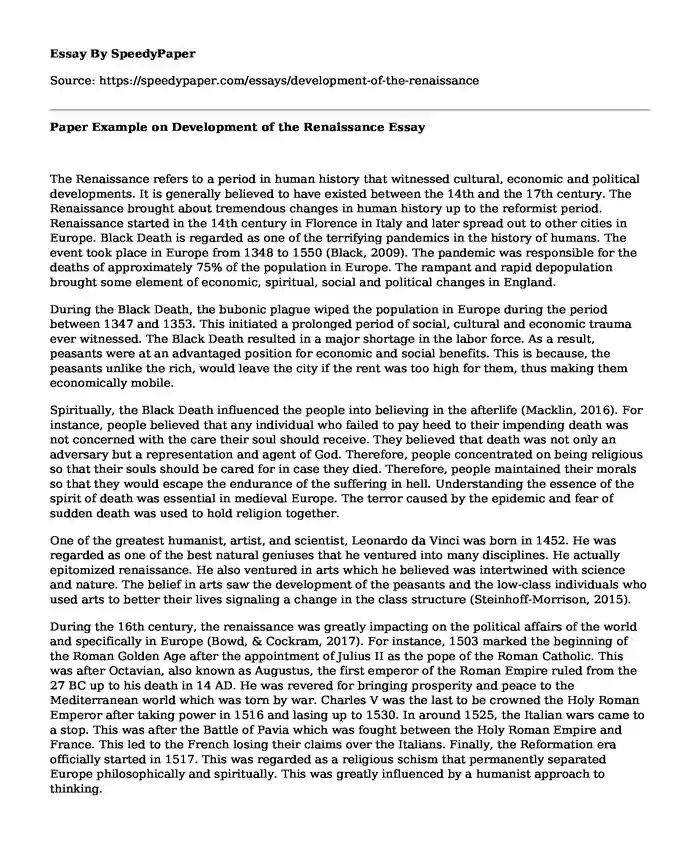
| Type of paper: | Essay |
| Categories: | History Art Human development Sustainable development |
| Pages: | 3 |
| Wordcount: | 709 words |
The Renaissance refers to a period in human history that witnessed cultural, economic and political developments. It is generally believed to have existed between the 14th and the 17th century. The Renaissance brought about tremendous changes in human history up to the reformist period. Renaissance started in the 14th century in Florence in Italy and later spread out to other cities in Europe. Black Death is regarded as one of the terrifying pandemics in the history of humans. The event took place in Europe from 1348 to 1550 (Black, 2009). The pandemic was responsible for the deaths of approximately 75% of the population in Europe. The rampant and rapid depopulation brought some element of economic, spiritual, social and political changes in England.
During the Black Death, the bubonic plague wiped the population in Europe during the period between 1347 and 1353. This initiated a prolonged period of social, cultural and economic trauma ever witnessed. The Black Death resulted in a major shortage in the labor force. As a result, peasants were at an advantaged position for economic and social benefits. This is because, the peasants unlike the rich, would leave the city if the rent was too high for them, thus making them economically mobile.
Spiritually, the Black Death influenced the people into believing in the afterlife (Macklin, 2016). For instance, people believed that any individual who failed to pay heed to their impending death was not concerned with the care their soul should receive. They believed that death was not only an adversary but a representation and agent of God. Therefore, people concentrated on being religious so that their souls should be cared for in case they died. Therefore, people maintained their morals so that they would escape the endurance of the suffering in hell. Understanding the essence of the spirit of death was essential in medieval Europe. The terror caused by the epidemic and fear of sudden death was used to hold religion together.
One of the greatest humanist, artist, and scientist, Leonardo da Vinci was born in 1452. He was regarded as one of the best natural geniuses that he ventured into many disciplines. He actually epitomized renaissance. He also ventured in arts which he believed was intertwined with science and nature. The belief in arts saw the development of the peasants and the low-class individuals who used arts to better their lives signaling a change in the class structure (Steinhoff-Morrison, 2015).
During the 16th century, the renaissance was greatly impacting on the political affairs of the world and specifically in Europe (Bowd, & Cockram, 2017). For instance, 1503 marked the beginning of the Roman Golden Age after the appointment of Julius II as the pope of the Roman Catholic. This was after Octavian, also known as Augustus, the first emperor of the Roman Empire ruled from the 27 BC up to his death in 14 AD. He was revered for bringing prosperity and peace to the Mediterranean world which was torn by war. Charles V was the last to be crowned the Holy Roman Emperor after taking power in 1516 and lasing up to 1530. In around 1525, the Italian wars came to a stop. This was after the Battle of Pavia which was fought between the Holy Roman Empire and France. This led to the French losing their claims over the Italians. Finally, the Reformation era officially started in 1517. This was regarded as a religious schism that permanently separated Europe philosophically and spiritually. This was greatly influenced by a humanist approach to thinking.
The study of the development of renaissance up to the reformation age by historians is a rather significant endeavor by historians. Through the study, the historians are able to detail some of the significant events that took place in the period which are majorly shaped by the occurrence of the Black Death. From the discussion above, it is evident that the renaissance is responsible for major changes socially, economically, politically and philosophically.
References
Black, J. (2009). Absolutism in Renaissance Milan. doi:10.1093/acprof:oso/9780199565290.001.0001
Bowd, S., & Cockram, S. (2017). The animal in Renaissance Italy. Renaissance Studies, 31(2), 183-200. doi:10.1111/rest.12299
Macklin, C. (2016). Stability and change in the composition of a 'Plague Mass' in the wake of the Black Death. Plainsong and Medieval Music, 25(2), 167-189. doi:10.1017/s0961137116000024
Steinhoff-Morrison, J. (2015). Black Death and medieval art. Oxford Art Online. doi:10.1093/gao/9781884446054.article.t2273208
Cite this page
Paper Example on Development of the Renaissance. (2023, Jan 10). Retrieved from https://speedypaper.com/essays/development-of-the-renaissance
Request Removal
If you are the original author of this essay and no longer wish to have it published on the SpeedyPaper website, please click below to request its removal:
- Free Essay with the Example of Marketing Strategy
- Research Paper Sample: Obesity Trends among Low-income Earners
- Essay Example on Assessing the Competitiveness of StopNShop Today
- Recruiting for Today's Workforce - HRM Essay Example for Free
- Summary of "Hiroshima" - Book Review Essay Sample
- Free Essay Sample in the Implementation of the Balanced Scorecard
- Essay Sample: Contingency Planning, Managing Health and Safety in the Workplace
Popular categories




